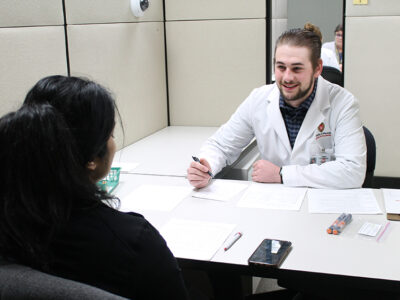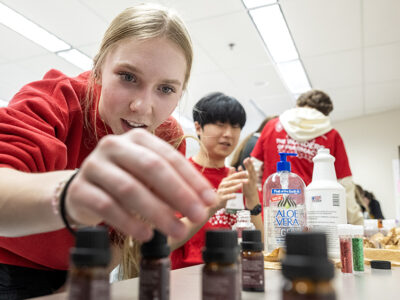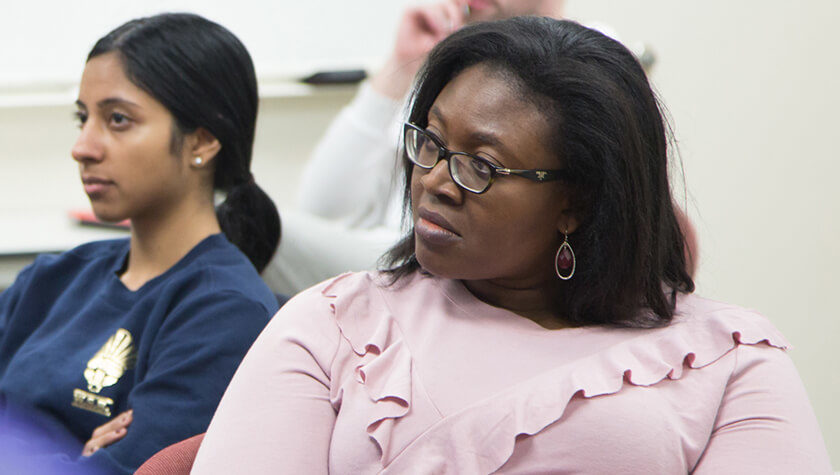
10
September

Community-engaged program led by Assistant Professor Olayinka Shiyanbola helps African American patients manage diabetes medicines
By Hanzhu Tang
Would you swallow medication without understanding what it would do? Or follow medical advice from someone you didn’t trust? If you’re like most people, probably not.
These are just two pieces of the broad puzzle of medication adherence. In many communities, low health literacy rates and mistrust of health care providers is common. Assistant Professor Olayinka Shiyanbola, in the University of Wisconsin–Madison School of Pharmacy’s Social and Administrative Sciences Division, is creating a new resource for patients: a network of community peers.
Shiyanbola and her research group are creating a community-engaged program, named Peers Supporting Health Literacy, Self-Efficacy, Self-Advocacy, and Adherence, to provide social support, culturally appropriate diabetes information, behavioral skill-development, and helpful toolkits for African Americans with Type 2 diabetes to optimize their medical outcomes.
“The program is about building up self-efficacy skills and creating a toolbox for patients to communicate with their family and health providers about diabetes,” says Shiyanbola.
She not only sees herself as a pharmacy scholar but also a sociobehavioral scientist working to motivate people to change their use of medicines, one step at a time.
Led by peers
Shiyanbola and her collaborators designed the project, dubbed Peers LEAD, to be an eight-week engagement for both patients and their peer mentors in the African American community. Patients, named “buddies” in the program, will be partnered with an ambassador who is successfully managing their Type 2 diabetes and taking their medicines. The ambassadors will also participate on a patient advisory board to help the research group get advice, collect feedback and make improvements in the process.
Beginning in fall 2019, participants will have three in-person meetings as a group, and buddies and their ambassadors will also have five weekly phone calls for 15 to 30 minutes during the program. The pairs will talk about their shared experience with diabetes and will touch on a range of topics: developing self-confidence with medicines, coping positively with diabetes, building relationships with health care providers, asking questions during clinic and pharmacy visits, discussing diabetes with family and friends, maintaining cultural experiences, and setting goals for improvements with medicine use.
“The program is about building up self-efficacy skills and creating a toolbox for patients to communicate with their family and health providers about diabetes.” –Olayinka Shiyanbola
During the in-person sessions, to help patients build up more connections, reduce distrust, and obtain professional perspectives, Shiyanbola and her team will also bring in a physician and pharmacist to facilitate conversations.
“If there are individuals who find it challenging to talk to a provider, why not have a provider come to the community?” says Shiyanbola.
The idea for the project comes from Shiyanbola’s 2016 research, when she was awarded a KL2 Scholar career development grant, supported by National Institutes of Health and the UW Institute for Clinical and Translational Research. The grant provides funding to enable young investigators to investigate, research, and develop independent research programs. Shiyanbola used the opportunity to explore African Americans’ beliefs about diabetes, reasons for nonadherence and African Americans’ perceived solutions through qualitative focus groups.
This laid the foundation for her to create the culturally appropriate medication adherence intervention: Peers LEAD. Through this four-year KL2 grant, using cognitive interviews and psychometric testing, she also developed a new survey tool that will now accurately measure African Americans beliefs about diabetes.
When patients struggle to properly adhere to their medications — taking the right dose of the right medication at the right time and in the right way — they often have worse health outcomes. Patients from racial minorities, such as African Americans, who are 25 percent less likely to adhere to prescription medicines, face steeper and unique challenges.
From observations and interviews with participants in her research, Shiyanbola has learned many patients are skeptical of their diagnosis and don’t trust the medications — if they don’t believe the medication will help them, why would they take it?
These misconceptions about disease and treatment impede adherence, as do confusion over medication use due to lower health literacy, which limits the ability of patients to communicate effectively with their health providers. They might not know what questions to ask their provider or pharmacist, or how to ask them.
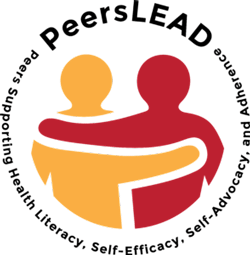
“In Madison, as is true in many places, there is a lot of distrust with the health care system and people frankly aren’t engaging fully, openly, and honestly,” says Jonas Lee, a physician with Access Community Health Centers, who is collaborating with Shiyanbola on Peers LEAD as a co-investigator and clinical consultant. “People are looking for reliable sources of information, and unfortunately I don’t think they necessarily first look to the health care system for that.”
While working with community members, Shiyanbola frequently heard the need for a network of peer support in the community, where patients could find someone to support them and to combat and control their diabetes together.
The Peers LEAD program was built out of the community’s needs for a support system and was designed to reach patients in a way that resonates with them the most.
“If we continue to practice with the barriers that currently exist in the system, it’s going to be difficult for us to make a lot of headway,” says Lee. “We need to find creative ways like Peers LEAD to approach these issues.”
The program will first launch in Madison this fall and Shiyanbola’s group plans to expand the program into Milwaukee by early 2020. With two recent grant awards from the UW–Madison Contemporary Social Problems Initiative and the UW Institute of Clinical and Translational Research, Shiyanbola has also been able to double the number of buddies in the Madison group from 10 to 20.
To measure the impact of Peers LEAD, Shiyanbola’s lab group will be monitoring patients’ glucose A1C level before the program begins and after the sessions have been completed.
Building on success
Before rolling out the program at a larger scale this fall, Shiyanbola’s group piloted a three-week version of the program in Madison in early 2018 to practice their plan, collect data and feedback from participants, and make additional improvements.
“They absolutely loved it,” says Shiyanbola. The outcomes exceeded her expectations. “Many of the ambassadors and their buddies connected over their shared experience of what it is like to have the same chronic disease that they are faced with every day.”
Although the matches are chosen based on age and gender alone, she was surprised to see how the pairs bonded over more than their disease management and became friends and confidants.
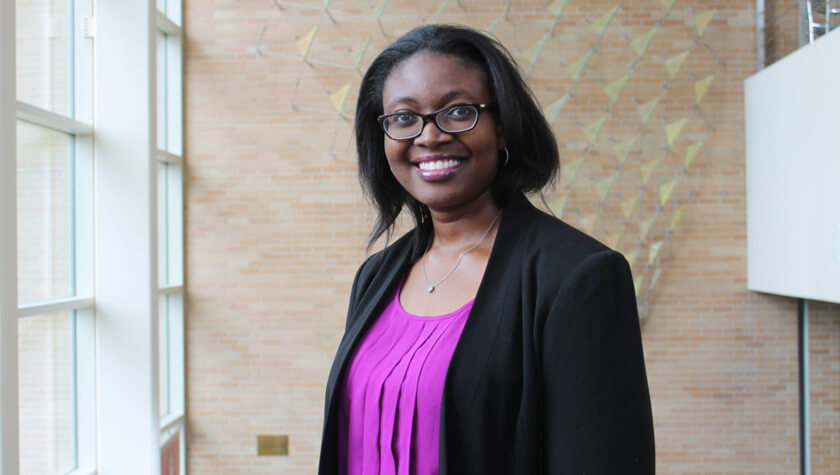
“Basically, we are creating a community but in a very private space,” says Shiyanbola.
Shiyanbola and her team gathered information from participants on how effective they found the group sessions with heath care team members. Most sessions had an 80 percent satisfaction rate, but the session with the pharmacist earned a 100 percent rating.
“That made me realize that people weren’t getting their questions answered by pharmacists because they didn’t know they could ask,” she says.
The pharmacist and practitioner attending the sessions weren’t answering any specific health questions, but instead were asking patients general questions about they are handling their diabetes: What concerns do you have about your medicines? What side effects do you experience? How do you handle them? Did you know can communicate with your pharmacists like this?
That conversation, paired with peer support, proved to make an impact on how patients approached their health care.
“At first, I wasn’t calling my pharmacy for help. However, after talking with my peer ambassador, I did, because she expressed her concerns about the effects that my medication was having on me. So I called them and talked about it,” says one of the pre-pilot participants. “I felt really good about that and the project indeed helped me a lot.”
Ambitions for community change
As one of the faculty consultants chosen for the 2019 Mixed Methods Training Program for Health Sciences at Johns Hopkins University, funded by the National Institutes of Health, Shiyanbola is mindful of the insights she’s gathering about her research, including Peers LEAD.
The Mixed Methods Training Program aims to shed new light on research: the collection, analysis, and integration of both quantitative data and qualitative data to provide a more comprehensive understanding of a research problem than could be otherwise obtained.
“For Peers LEAD, we are using an advanced mixed methods design, integrating both qualitative and quantitative research, using focus groups with peer ambassadors, interviews with buddies, administering surveys and tracking their A1C. It is rather helpful for us to get new information throughout the project,” says Shiyanbola.
The data her team is gathering and analyzing, in collaboration with researchers and health professionals in both Madison and Milwaukee, will help inform the future of the program.
“There is a lot of potential if we can keep this pilot up and running and see how it works. But the big goal is to make this program sustainable long term,” says Lee.
“Many of the ambassadors and their buddies connected over their shared experience of what it is like to have the same chronic disease that they are faced with every day.” –Olayinka Shiyanbola
In the short term, they hope to provide support for patients and innovate the landscape of chronic disease management. In the long run, the group is aiming for changes across the health care system.
“We hope that it will be a bridge to the community. It will be interesting to see where the peer ambassadors land and what kinds of roles they could play as an extension of the health system as well,” says Lee.
Shiyanbola also hopes to see the links strengthened between this community-engaged program and the health care system.
“We want to create connections with Milwaukee Health Services and federally qualified health centers. But we still need to figure out whether we should keep Peers LEAD housed and managed in the community, or as something we would incorporate as part of a clinic’s programming,” says Shiyanbola.
Lee sees this project as an efficient experiment and assessment for current health systems to examine the health disparities within African American communities, which will get them close to the patients and break down more barriers in the system. “If these projects can be successful, we can get data to show how we can make a difference,” says Lee.
Shiyanbola considers the process as empowerment and education for people with diabetes. “It is about informing people and giving them the tools to manage their medicines to help break the barrier and mistrust between health care providers and patients,” she says.
Read more about Assistant Professor Olayinka Shiyanbola’s past research on patient-centered approach and efforts made by her lab group.
Learn about another community-based diabetes management program: Peers Empowering Peers.





